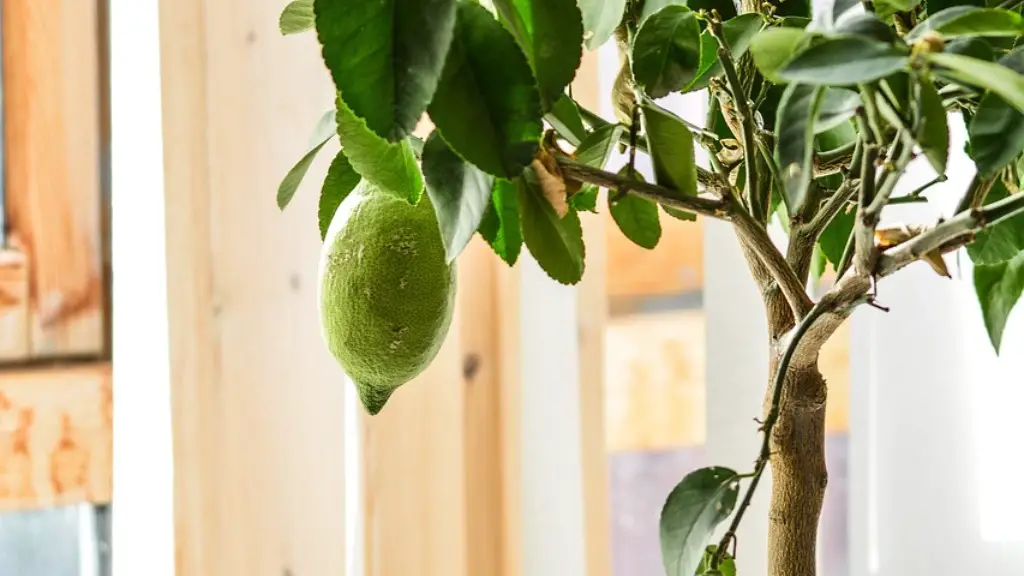Lemon trees require soil with certain qualities to properly thrive. Knowing the kind of soil that is best for lemon tree planting is essential for the trees’ development and productive growth. Generally, lemon trees need freely draining, slightly acidic loam soil to grow and produce fruit. Loam is soil which contains a balance of clay, silt, and sand particles. The soil should have a relatively high organic matter content and should not be overly-compacted as this can restrict water and nutrient intake.
When selecting the site for a lemon tree garden, a soil test should be taken to determine the pH level and structure of the soil. The ideal pH level of the soil is 6.0 to 6.5, which is slightly acidic. If the soil pH is much higher than this, the soil should be treated with a blender-based fertilizer before planting. Additionally, loam soil should have a crumbly texture and free drainage as too much water can lead to root rot and other diseases.
When planting a lemon tree, the size and type of the soil mix is very important. A light, well-drained soil mix that holds water but does not become soggy when wet is best. A good soil mix should contain a blend of equal parts coconut coir, sand, and soil, though some components may be omitted depending on the specific type of lemon tree being planted. Soil amendments may also be added, such as compost or peat moss, to improve drainage and hold moisture.
It is also important to keep the soil in the lemon tree garden moist. During dry summers, the soil should be watered 2 to 3 times a week. The water should be allowed to penetrate deep into the soil, and if the soil becomes very dry, water should be supplemented with a sprinkler system or drip irrigation. Applying mulch around the base of the lemon tree can also help to retain moisture and suppress weeds.
Finally, it is important to fertilize the lemon tree regularly. A balanced granular fertilizer like an 8-8-8 formula should be applied in early spring and mid-summer. Alternatively, a liquid fertilizer can be applied every 6 to 8 weeks for optimal growth. Applying fertilizer too often can damage the plant, so be sure to stick to the recommended application schedules.
Types of Soil Conditions for Lemon Trees
When selecting the site for a lemon tree garden, there are a few soil conditions which should be taken into consideration. Firstly, the soil should be sandy loam which has good drainage, as the lemon tree can not tolerate soggy conditions. Secondly, the soil pH should be around 6.0 to 6.5, as this is slightly acidic which is optimal for lemon trees. Thirdly, the soil should have high organic matter content, which can be achieved by incorporating compost or peat moss into the soil mix. Fourthly, the soil should also be free of any compaction as this can restrict water and nutrients from reaching the lemon tree’s roots. Lastly, amendments like fertilizers and mulch can help with moisture retention and healthy growth.
Maintaining Moisture in the Soil
It is crucial to ensure that the soil in the lemon tree garden is adequately moist. During dry summers, the soil should be watered 2 to 3 times a week. When watering the soil, it is important to allow the water to penetrate deeply as this will prevent root rot and nutrient deprivation. If the soil is drying out too quickly, a sprinkler system or drip irrigation can be installed to ensure adequate water supply. Mulch can also be added around the base of the lemon tree to help retain moisture levels in the soil and prevent weed growth.
Fertilizing the Soil
Lemon trees require regular fertilization throughout the year. A balanced, granular fertilizer like an 8-8-8 formula should be applied in early spring and mid-summer. Alternatively, a liquid fertilizer can be applied every 6 to 8 weeks for optimal growth. Applying fertilizer too often can damage the lemon tree, so be sure to stick to the specified application schedules for best results.
Using Planting Mixes for Lemon Trees
When planting a lemon tree, using a planting mix composed of a blend of equal parts coconut coir, sand, and soil is often recommended. This type of planting mix is ideal as it allows water to penetrate and drain, while also providing enough moisture to prevent drought-like conditions. To further improve drainage and moisture retention, soil amendments like compost and peat moss can also be added. Additionally, planting mixes should not contain any chemical treatments or chemical-based fertilizers.
Minimizing Compaction of Soil
Compaction of soil can be severely detrimental to the health of lemon trees and their roots, therefore it is important to minimize soil compaction in the lemon tree’s garden. Gardeners should take care not to walk on wet soil, as this compresses and diminishes the soil’s capacity to absorb and repel water. After planting, anemic soils can also be raised with organic matter, such as compost or bark, to improve soil aeration and reduce compaction.
Other Considerations for Lemon Tree Soil
Other considerations for ensuring optimal lemon tree growth and fruit production include soil fumigation and alkalinity. In some regions, soil fumigation may be necessary to remove or control harmful fungi or nematodes. Additionally, the alkalinity of the soil should be taken into consideration, as a soil pH higher than 6.5 can cause nutrient deficiency and stunted growth. To lower the soil’s alkalinity, a blend of organic and slow-release nitrates should be incorporated into the soil.


